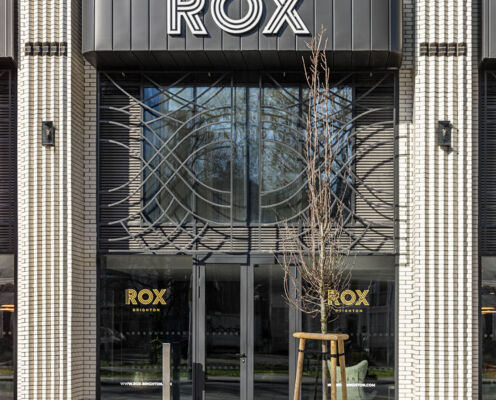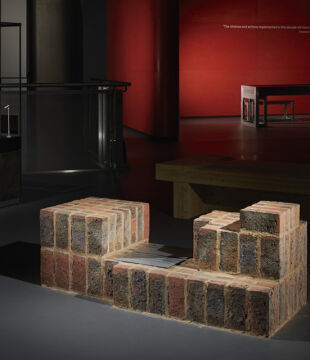
Details
Location: Brighton
Brick Manufacturer: Ibstock Brick Limited
Brick Name: Surrey Yellow Multi, London White Glazed & Pewter Grey Glazed
Architect: Cove Burgess Architecture
Contractor: Sackville Construction
About the project
The ROX is a new build mixed-use development in Gloucester Place, Brighton. The design for the new building draws on the history of the site, where the 1930s Art Deco Astoria theatre had been sitting vacant for several years. The scheme is composed of three volumes organised around a central courtyard. The proposal uses the characteristics of the site to create a development of urban richness composed of 70 units. These consist of traditional apartments in a seven storeys above ground volume overlooking Gloucester Place and the new Valley Gardens, three storeys above ground town houses along Blenheim Place and duplex apartment overlooking the courtyard. At ground and basement level allowance have been made for retail, co-working, community space, amenity space and cycle parking. A planning consent had been granted before our involvement. We proposed a change in design that, sympathetic to the consented scheme, would enhance the volume, increase the active frontage on ground floor, optimise the internal circulation, and improve the flats layouts by providing a higher number of through flats with dual aspect facing east and west.
The 1930s Art Deco Astoria theatre is replaced by an architecture that draws on its predecessor. The composition of the façade and it intricated brick features are remainders of the previous building.
The front elevation of the main building is divided in 7 bays split by white glazed brick piers. The white piers, in contrast with the dark grey metal clad balconies and aluminium curtain walling, provide a rhythm to the façade by enhancing its vertical proportions. The end bricks are laid following a dogtooth arrangement and are enriched by pewter grey glazed features at the bottom, second floor and top of the pier. The brick piers enclose rainwater pipes from the roof and other services.
The side and rear elevations are clad in Surrey Yellow Multi brickwork with similar but smaller white glazed dogtooth brick feature, to break the extensive surface and to arrange windows in pairs.
The rear portion of the building is finished in white render, with dark aluminium frame windows to create a contrast. The west and south portions are capped with one floor clad in pigment brown zinc panels to fit with the surrounding roofs.
The structure is an in situ concrete frame with flat slabs and concrete cores for lateral stability. Passive environmental factors, such as massing arrangement and façade design, have influenced the proposal. Particular attention was given to the detailing of the façade where the front elevation, made of wide full height curtain wall glazed panels, is shaded by the protruding vertical brick piers and cantilevered horizontal metal clad balconies and canopies; whereas the South and West elevations were designed with a reduced amount of glazing to contain solar gains.
Flexibility and adaptability for a long-life/loose-fit future were factors considered in the design. Several original features were retained from the Astoria and reused in the new building as a heritage statement but also to reduce the amount of waste material.
Sponsored by Architecture Today

Architecture Today is a multimedia portfolio spanning print, digital, social media, exhibitions and events. The Architecture Today brand is widely respected for outstanding design, authoritative writing and insightful analysis by high-profile architects and commentators.
Launched in 1989 with the backing of 70 leading practices, it continues to be owned and run by a small, independent, highly committed team with deep roots in the architectural community.















